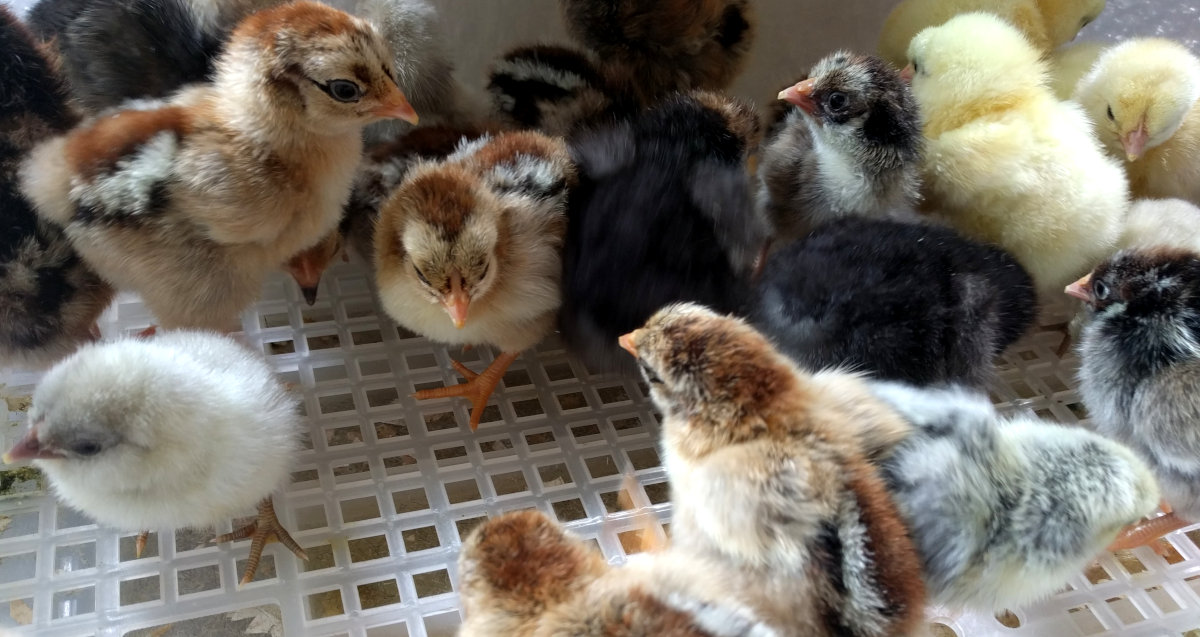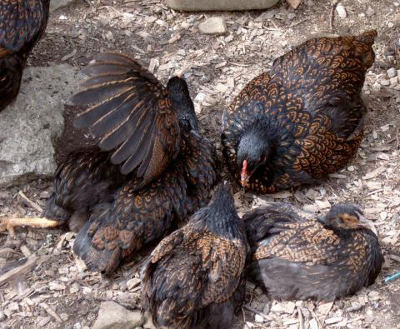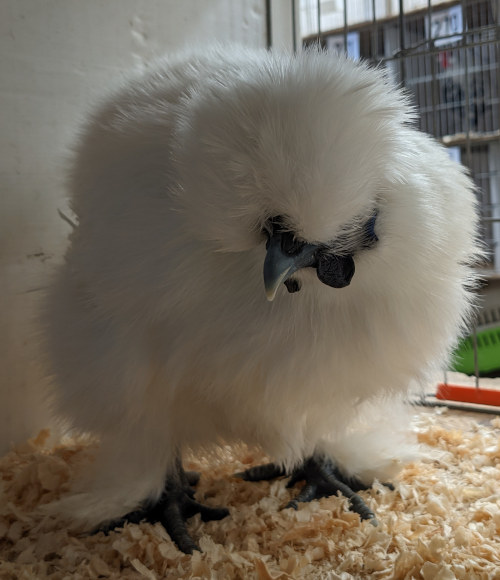What is the best age to buy chickens. That's the chickens' age and not yours!

There are advantages and disadvantages whatever age you decide to but your chickens at. Hatching eggs may be cheap but 50% will be roosters that need dealing with.
In my survey of chickens keepers I found that buying chicks was the most popular option, followed by hatching your own and then buying reared pullets.
Table of Contents
If you're new to chicken keeping, starting with pullets or young hens is often a good choice because they are easier to manage and you won't have to wait as long for them to begin laying eggs. However, if you're experienced or looking for a specific purpose, other options may be more suitable.
What is the best age to get chickens?
The best age to buy chickens is POL or Point of Lay if you want eggs quickly. This is when the hen is on the point of laying her first eggs and is around 19 weeks of age in hybrids and 24 weeks of age in heritage breeds of chickens.
If you want the satisfaction of rearing your own flock then fertilised hatching eggs or day old chicks will be more rewarding.
You need to consider your available time and budget, the space available for the coop, and the number of chickens you want.
Below: Day old chicks are cute, but they are also hard work and consume much time.
An important thing to remember is chickens get more expensive the older they are, hatching eggs is the cheapest way to go and tested breeding flocks is the most expensive.
The best age to get a chicken is what you want to accomplish and your lifestyle. If you are time poor then getting hatching eggs or day old chicks is not the way to go and reared pullets or in lay hens will be the best.
When should you buy chickens?
You can buy chickens as:
- Fertilised hatching eggs.
- Day old chicks.
- Growers or teenagers.
- Point of lay (POL), sometimes called reared pullets.
- In lay.
- A proven and tested breeding group.
Time to cost ratio table for the different ages of chickens:
| Age at purchase. | Time to first eggs | Relative cost |
| Fertile eggs | 24 to 30 weeks | High Equipment and feed costs. |
| Day old chicks | 19 to 25 weeks | High. feed is expensive. |
| Growers | 12 to 16 weeks | Average. Avoid hatching and brooding. |
| POL | 2 to 4 weeks | Low. |
| In lay hens. | 1 to 2 weeks | Low. |
| Tested breeding group. | 1 week | Individual birds expensive but cheaper in the long run. |
Fertilised hatching eggs are a great way to get started with chicken keeping. They can be purchased from various breeders and hatcheries and are quickly shipped to the customer's location. These eggs can be hatched in an incubator or under a broody hen.
Below: There is much satisfaction and wonder in hatching your own eggs but they equipment is expensive and the time investment is high. Here is a fertile egg being candled.
Fertilised eggs are the least expensive way to start a flock and allow for the most customisation for the would-be flock owner. In addition, by choosing specific breeds, you can ensure that your chicks will be docile and easy to handle.
There is a special feeling involved in hatching one's chicks and a sense of accomplishment when the first fluffy chicks make their appearance.
The drawback of fertilised eggs is the certainty of having to dispose of some roosters. Also, it does not always guarantee success when you put eggs under a broody hen or in the incubator.
Buying fertilised eggs requires some technical knowledge about the hatching process, so it may be best for someone with more experience.
Day-old chicks have that adorable fuzzy look that people can't resist. It is no wonder that so many people fall in love with them. However, day-old chicks are delicate and require constant care to ensure their survival. Everything from feeding them and cleaning their area to continuous monitoring is needed.
Chicks are more susceptible to diseases and other issues than adults. This means that with every day-old chick you purchase, you have a slight chance of losing one of your flock. But they are less expensive than grown birds. Raising chicks can be a fulfilling experience that people of all ages enjoy.
If you are breeding day-old chicks to get fresh eggs, you may have to wait for four to five months before they start laying eggs.
Like fertilised eggs, an experienced breeder should buy them because of the delicate nature of the birds. But if you insist on buying them, you must be willing to adhere to their feeding schedule and supplement their diet and all other labour to aid their survival.
Growers are immature birds around ten weeks old. They have not reached reproductive age and will not start laying eggs for 12 to 16 weeks.
Growers are much less likely to get sick and die than day-old chicks, but remember that they are still susceptible.
Below: These Barnevelder growers are ready for new homes.

The big advantage of buying growers is they have finished in the brooder so you do not need the expensive equipment and chick crumb to rear them.
If you add them to your existing flock, care must be taken when introducing them to prevent fighting and bullying. Ensure that your existing flock knows the new birds are part of the family and not a threat.
The only real disadvantage to growers is that they are more expensive than day-old chicks.
Reared pullets or point of lay hens are chickens that are ready to lay eggs although the reality is it could well be 2 to 4 weeks before they begin to produce.
When purchasing a point of lay chicken, you are looking for chickens that have been bred to be good layers. The breeders will take the best birds from their flock and select those that will produce most eggs. They can be purchased from any hatchery, but they are one of the most pricey options.
Below: Reared pullets or point of lay red sex links.
The advantage to purchasing point of lay birds is that they can start laying eggs as soon as they arrive at your home, which is a real bonus if your existing flock has stopped laying eggs. The disadvantage is that they are costly.
Both experienced and new chicken owners can breed these birds.
In lay chickens or adult birds are in their prime laying age, and this is typically when most backyard chicken owners get their birds.
One advantage of buying a laying adult hen is that she will begin laying soon, so there will be no waiting around for fresh eggs, and the seller should be able to tell you how many eggs she is likely to lay.
Below: An in lay fully grown hen. The easiest way to buy chickens and you know exactly what you are getting.

This is the best age to purchase chickens solely to lay eggs. Although more expensive, these birds are very independent and hardy; thus, they don't require any special maintenance and can be kept very quickly.
Tested or proven breeding groups is a way to buy show stock or guaranteed birds. This is the most expensive way to buy chickens but also has the least waiting time for eggs and you know exactly what you are getting.
What to consider before buying a chicken of any age?
When making a purchase, you should keep in mind that its breed will also determine the bird’s price.
If you are buying a chicken as a pet, it is best to buy a young one to ensure it is free of disease and easily tamed.
Before you go out and buy chickens, there are several things you must take into consideration. For instance, do you want a rooster in your flock or only hens.
Looking after chickens requires a time commitment as they are animals that need to be cared for. You cannot just set them free into your backyard and expect only to have to feed them every so often.
You must care for them each day, as they need to be fed and watered and their house cleaned out. Also, when they start producing eggs, it takes a fair bit of time to collect them all.
You must have a good house for your chickens. The closer the conditions resemble that of their natural habitat, the better off they will be. They need somewhere to lay their eggs and sleep, so you must provide a shed or coop that has roosts (perches) in it.
The number of chickens you intend to breed must be on your mind as well. If you want to breed many chickens, you should consider building a bigger shed or coop. This gives the chickens more space and better conditions to raise their many offspring.
The noise factor should also be considered. If you have neighbours nearby, then their noise level could disrupt your peace. It can be deafening when a chicken is laying an egg, and they tend to cluck frequently in the mornings and evenings.
You should have your finances in mind before committing to buying a chicken. It can be relatively cheap to buy one, but it will cost you more if you plan on breeding them. A good coop and shed can cost a fair bit of money as well.
Look up your local ordinances and regulations. Some cities will not allow you to own chickens or may even charge a fee if you do. You must abide by the laws if you would like to keep your pet chickens.
Chickens can be messy and create damage to your yard. They will dig in your garden if you do not keep them fenced in and deposit waste everywhere. It is up to you if you are willing to deal with this mess or not.
If you live in an apartment or condo, it is unlikely that you will keep chickens at all. If any of your neighbours are against chickens, you may have to put your plan on hold. Sometimes you may be able to convince them that you will contain the smell from the coop and make sure to build an enclosed area to keep the chickens in to prevent them from creeping into their space.
It's addictive to raise chickens. After you have begun, you won't be able to stop. The next time you go to a poultry show or fair, you will want to buy more chicks or a new, fancy breed.
Thus, you must build your coop large enough to accommodate more birds than you intend to have at the start and adequately introduce new birds.
